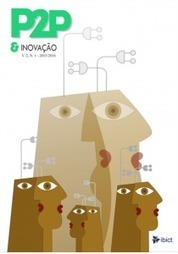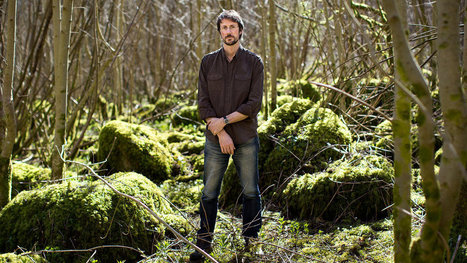 Your new post is loading...
A discussion on the weaving of science and commons: what's public, what's private and the ways we understand, produce and socialize science.
In this article, we review the workplace battleground and explore the potential of social media for mobilizing social movements in labour conflicts and beyond. By conducting a case study with...
In the past several years, a movement of feminist and social justice-oriented hackerspaces has made itself visible in different parts of the world, more precisely in Australia, Europe and now on the West Coast of the United States. These spaces rely and are founded on specific feminist principles in order to counter patriarchy and other forms of oppression. This article tells the story of FemHack, the emerging feminist hackerspace in Montreal. A comparatively recent initiative of feminists who enjoy hacking and do-it-yourself activities, the community's main goals are to invite more feminists into the broader hacker movement and to start a discussion about feminist participation within the worldwide hacker culture and politics.
By 2020, Millennials will comprise more than one of three adult Americans. It is estimated that by 2025 they will make up as much as 75 percent of the workforce. Millennials’ desire for pragmatic action that drives results will overtake today’s emphasis on ideology and polarization as Boomers finally fade from the scene. Thus, understanding the generation’s values offers a window into the future of corporate America.
This essay argues that, in the face of the deep pathologies of neoliberal capitalism, the commons paradigm can help us imagine and implement a transition to new decentralized systems of provisioning and democratic governance. The commons consists of a wide variety of self-organized social practices that enable communities to manage resources for collective benefit in sustainable ways. A robust transnational movement of commoners now consists of such diverse commons as seed-sharing cooperatives; communities of open source software programmers; localities that use alternative currencies to invigorate their economies; subsistence commons based on forests, fisheries, arable land, and wild game; and local food initiatives such as community-supported agriculture, Slow Food, and permaculture. As a system of provisioning and governance, commons give participating members a significant degree of sovereignty and control over important elements of their everyday lives. They also help people reconnect to nature and to each other, set limits on resource exploitation, and internalize the “negative externalities” so often associated with market behavior. These more equitable, ecologically responsible, and decentralized ways of meeting basic needs represent a promising new paradigm for escaping the pathologies of the Market/State order and constructing an ecologically sustainable alternative. - See more at: http://greattransition.org/document/the-commons-as-a-template-for-transformation#sthash.nfQ8Jusp.ovW1OUIu.dpuf
The Coming Revolution of Peer Production and Revolutionary Cooperatives. A Response to Michel Bauwens, Vasilis Kostakis and Stefan Meretz
In the 19th century, the counter-hegemonic forces of labour focused on the democratisation of the state as well as focusing on the redistribution of the surplus value created by labour. Both tasks are by no means obsolete given the evolution towards market state models which have hollowed out popular democracy, as well ans the increased role of debt in human exploitation1. However, what is now needed in addition, for and by 21st century social movements, is the democratisation of the means of monetization. In a contributive economy, use value becomes key, and undermines mechanisms based on labor value alone; value must therefore become pluralistic and diverse, and so must monetary means; while undoubtedly, demonetization will be a good thing in many sectors under a regime of civic domination, we will also need new forms of monetization, and restore the feedback loop between value creation and value capture. As we will argue, the current value regime, which we call ‘cognitive capitalism under the emergence of netarchical capitalism’ (see infra), is unable to redistribute value in a fair way, and is creating not just a crisis of social reproduction for working people, but also a crisis of accumulation of capital. In our article, value and money regimes are placed in the context of the evolution of the overall political economy toward an increasing importance of models based on peer production. We will look at what kind of social system and policy transition, that can solve this crisis of value.
As any cynic will confirm, money and law have a lot in common. But their ties run even deeper than most suspect. Money and law had similar origins: both arose spontaneously out of the undirected actions of individuals seeking common standards for mutual coordination. Money and law developed in parallel fashion, too: medieval Europeans enjoyed competition in currencies and legal systems until monarchies took over both fields. And state monopolies in money and law now present common hazards: they are imposed by fiat, inefficiently operated, and (as the cynics point out) jointly corrupting. However, a new generation of scholars has come to question the need for state monopolies in money and law. In the place of central banks they advocate a free banking system. In the place of state legal systems they advocate overlapping private jurisdictions in free and open competition -- a polycentric legal system.
Prior studies in the area deal with descriptive aspects of peer production, failing to capture the idea that while contributors collaborate, they also compete for status in the community and for imposing their views on the product.
|
P2P & INOVAÇÃO is a new journal linked Grupo de Pesquisa Economias colaborativas e produção P2P no Brasil (Collaborative Economy and P2P Production in Brazil Research Group) from Instituto Brasileiro de Informação em Ciência e Tecnologia (IBICT). The second volume has just been published and includes, amongst others, articles authored by P2P Foundation collaborators. This …
* Article: Theorising and analysing digital labour: From global value chains to modes of production. By Christian Fuchs. The Political Economy of Communication, Vol 1, No 2 (2013) From the abstract: “This paper considers the following question—where do computers, laptops and mobile phones come from and who produced them? Specific cases of digital labour are …
“The case of the jasmine flower growers in coastal Karnataka is an example of a local successful grassroots enterprise that has proved robust for over 70 years. The aim of this research is to examine the history, mechanisms, interconnectedness, and success of the jasmine growing program in coastal Karnataka and assess its compatibility with the community-based enterprise (CBE) model as proposed by Peredo and Chrisman [Peredo, A.M., and J.J. Chrisman. 2006. Toward a theory of community-based enterprise. Academy of Management Review 31, no. 2: 309–28]. We found that the existence of a natural, autonomously developed CBE without ‘western’ intervention can help to fine tune our knowledge of sustainable CBE and assist in helping practitioners learn what works and what does not when proposing a CBE.”
The latest trend in our quest to fix the global challenges of the 21st century is to ‘lab’ complex issues. In short, a lab is a container for social experimentation, with a team, a process and space to support social innovation on a systemic level. These social innovation labs are popping up all over the world and are quickly acquiring star status among funders and governments. Zaïd Hassan coins the emergence of labs as a “social revolution” for its ability to tackle large challenges, such as dramatically reducing global emissions, preventing the collapse of fragile states, and improving community resilience.
At the beginning of the nineteenth century, most people identified only with the real communities they were part of. An average European saw scarcely a hundred different faces in their whole life. The small, local, real community, with its barely-monetized agrarian economy, gave each person an identity that allowed him/her to understand who was who in the social system, and what role each one was playing in the production of everyone’s well-being. This is still the dominant identity in a good part of the rural world in developing countries.
Late one night last August, on the chalk downlands of southern England, Paul Kingsnorth stood in a field beside an old-growth forest, two yurts and a composting toilet. Kingsnorth is 41, tall, slim and energetic, with sweeping brown hair and a sparse beard. He wears rimless glasses and a silver stud in his ear, and he talks with great ardor, often apologizing for having said too much or for having said it too strongly.
In this blog entry I summon the Light Side and also the Dark Side, then ask what binds them together. So my answer to the Open Thoughts 2014 Question ― How many peers does it take to change a light bulb? ― is “3”. Namely, Rebel General Dodonna, the Emperor Palpatine himself and Jedi Master Obi-Wan Kenobi. Open Thoughts for Open Force!
(2014). Comment on ‘Organization in the Crowd: peer production in large-scale networked protests’. Information, Communication & Society: Vol. 17, The Networked Young Citizen, pp. 261-263.
“What do we really want from the businesses in our communities?...Perhaps we first need to ask: what kind of community do we want?
|
 Your new post is loading...
Your new post is loading...























